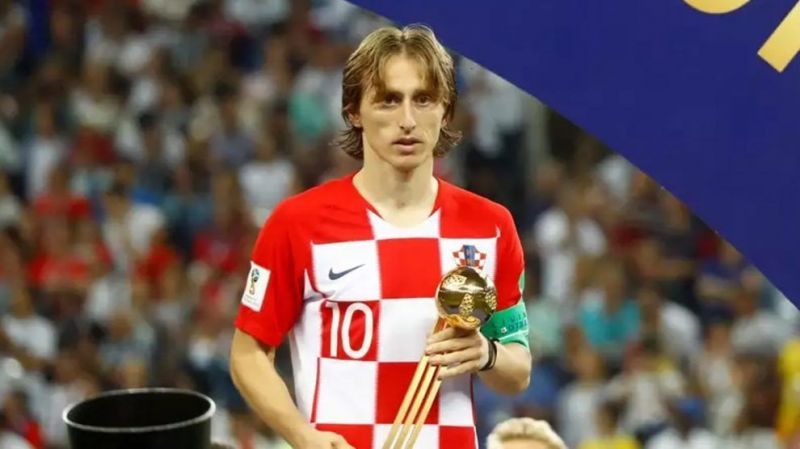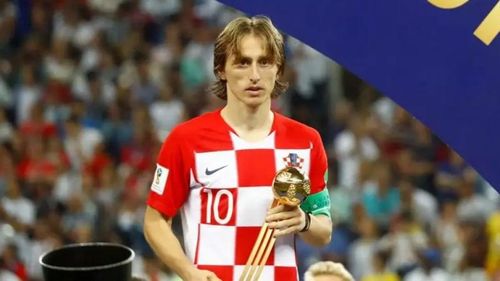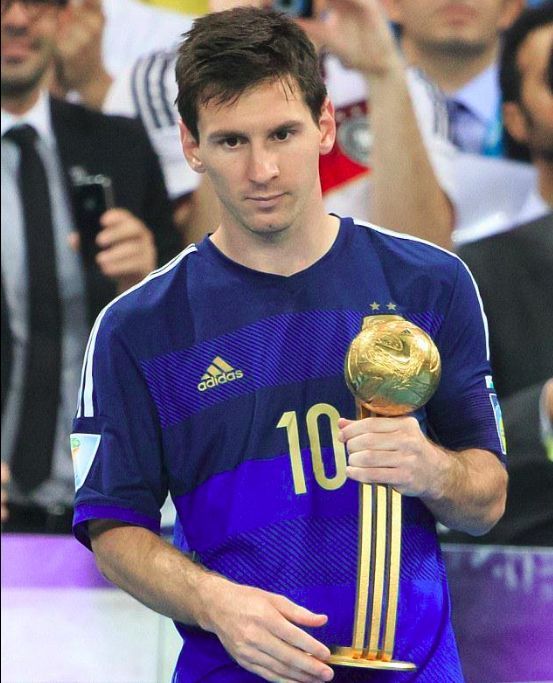
The unfortunate tales of the LM10 tag
If you understood the headline, then you have been following football for the last five years or at least know what happened in the last two World Cups. If not, let me explain!
Both the LM10s, namely Lionel Messi and Luka Modric, reached the finals of the 2014 and 2018 World Cups respectively and both lost. They were unfortunate enough to lose at the last step. But were they just unlucky or was it something else?
Luka Modric

Luka Modric, who is one of the best midfielders in the world, has won 14 trophies with Real Madrid. Those include four UEFA Champions Leagues, three FIFA Club World Cups, three UEFA Super Cups, two Spanish Super Cups and one each of Copa del Rey and La Liga. At Dinamo Zagreb, he won three league titles, two Croatian Cups and one Croatian Super Cup.
The 32-year old isn't just the winner of these trophies like everyone else on the team. He has been one of the best players in the club and has played his heart out.
Modric was said to be a flop in the 2012-13 season, when he came to Real Madrid from Tottenham. Since then, he has become one of the best. He's the one pulling the strings from deep midfield. He creates the attacking chances and looks for opportunities to pass the ball up front. He's a perfect play-making number 10.
If you check the statistics of the Croatian, don't get fooled into believing that he's an average player. But anyone who has watched his match(es) would surely say otherwise, because he's magical and the most influential player on the pitch.
Lionel Messi

Lionel Messi is arguably the best footballer in the world, and is also said to be one of the greatest footballers of all time. He has won 32 trophies for his club, which comprises of nine league titles, seven Spanish Super Cups, six Copa del Reys, four UEFA Champions Leagues, three UEFA Super Cups and three FIFA Club World Cups.
For Argentina, Messi won FIFA U20 World Cup in 2005 and the Olympic Gold Medal in 2008.
Born in Argentina, he was diagnosed with a growth hormone deficiency as a child. At the age of 13 in 2001, Barcelona agreed to pay for his medical treatment. So he travelled to Spain to join Barcelona.
After amazing progress in the La Masia academy, La Pulga made his competitive debut, when he was just 17 years old and the rest is history.
The Argentine has great agility and ball control, thanks to his low centre of gravity. Despite being so small, he has great upper body strength. He's one of the unique players who can accelerate very quickly even while he has possession of the ball.
He's a prolific goalscorer who has numerous records to his name. He can play anywhere across the forward and midfield lines.
The great Argentine legend, Diego Maradona once said, "The ball stays glued to his foot; I've seen great players in my career, but I've never seen anyone with Messi's ball control."
International worries for LM10s
If we take the number of international trophies won by both Messi and Modric combined, it just counts up to 2 (2+0), against the club trophy count of 52(32+20).
Out of the two won by Messi, one is an U20 trophy, and the other one is the Olympics. And it is common knowledge that most teams don't field their best available team for Olympic football. So practically speaking, both LM10s haven't won a major international trophy yet. Why is it so?
In terms of international football, both Lionel Messi and Luka Modric have been seriously unlucky.
Major tournaments played by Messi
Messi's first major tournament was the 2006 FIFA World Cup, where he started his World Cup journey with Argentina in the second group match against Serbia and Montenegro. He made his mark in the game with an assist and goal. He was also given opportunity in the next match against Netherlands, which ended in a stalemate.
In the round of 16 match against Mexico, which was played on Messi's 19th birthday, he came on in the 84th minute when the score was 1-1. He was able to find the back of the net, but it was ruled offside. Argentina went on to win in extra time thanks to a late goal from Maxi Rodriguez.
The Argentine coach Pekerman decided to leave Messi on the bench against Germany, which received a lot of criticism as Argentina went out of the tournament with a 4-2 loss in the penalty shootout. Many beleived Messi could have been the difference had he been given the chance.
Next, it was the 2007 Copa America for Messi to play for Argentina. In the group stages, Messi had two assists to his name as they won all three matches played. In the quarter-final and semi-final, he scored one goal each against Peru and Mexico respectively.
But the final was unexpected for Argentina as Brazil won 3-0. Messi was named the best young player of the tournament.
The 2010 World Cup was the first tournament Messi played in the No.10 jersey for Argentina, and he excelled in that tournament. They won all the group matches, and defeated Mexico in the round of 16 by a score of 3-1 - with Messi providing the assist for the first goal.
But Germany tore down the blue-and-white striped defense with 4 goals to nil in the quarter-final match.
Messi was identified by FIFA as one of the 10 best players in the 2010 World Cup. But he faced his share of criticism as well; many accused him of caring more for his club than his country.
The 2014 World Cup was the perfect time for Leo to win a major trophy. And that was reflected in the tournament too as he scored 4 goals in the group stage, ensuring all possible 9 points.
In the round of 16, Messi provided the decisive assist in extra time against Switzerland. Argentina won the quarter-final match against Belgium 1-0 which advanced them to the semi-final, where Messi and company eliminated Netherlands 4-2 in penalty shoot-out.
The final was termed as the the world's best player, Messi, against the best team, Germany. In the starting minutes of the match, Messi created a goal which ended in the net, but was ruled offside.
No goals came after that, except the Gotze winner in extra-time. Messi was awarded the Golden Ball as the best player of the tournament. But even then he faced criticism due to his lack of goals in the knockout stages.
Then came the 2015 Copa America where Argentina drew 2-2 with Paraguay in the opening match, which included Messi's only goal of the tournament. They went on to win every match till the final, including a 6-1 semifinal victory which showed Messi's playmaking skills - he provided three assists in that match.
In the final though, Messi couldn't perform up to his reputation as Chile won 4-1 in a penalty-shootout. He was selected as the most valuable player, but he rejected the award. Argentina continued its trophy drought as Messi continued receiving criticism, along with most of his team-mates.
Messi came to the 2016 Copa America Centenario with a back injury. He was benched in the opening match which cost three points for Argentina from a 2-1 Chile win.
In the second match against Panama, Messi came on as a substitute in the 61st minute and played a masterful game; he scored a hat-trick in just 19 minutes and assisted a goal. The match ended 5-0.
In the quarterfinal match against Venezuela, Messi scored one and assisted two goals as they won 4-1. Again in the semifinal, Messi scored one and assisted two as they reached the finals.
But unluckily for Argentina, it was a repeat of the previous Copa America as Chile won in penalties again, with even Messi missing the spot-kick. He was named in the team of the tournament.
This loss left Messi so disconsolate that he announced his retirement from international football. But he returned later when he had recovered from the setback.
The 2018 World Cup also started with despair for Argentina and Messi fans, as they drew 1-1 with Iceland - with Messi missing a spot-kick. The next match was possibly the worst ever performance of Messi and Argentina as they lost 0-3 to Croatia.
That match showed that if Messi doesn't play well, Argentina doesn't play well. But in the final group match, much to the relief of their fans, Messi scored the opener in the 2-1 victory which saw them advance from the group as runner-ups.
In the round of 16 match against France, Messi provided two assists as Argentina lost 3-4. France went on to win the World Cup.
Major tournaments played by Modric
The 2006 World Cup was just a small opening for Modric; he appeared as a substitute in the two group matches against Japan and Australia. Croatia didn't advance from the group.
The next tournament was the Euro 2008 where Modric scored the lone goal in the first match against Austria. Croatia won all three matches, even against Germany. But in the quarter-final, they lost 3-1 against Turkey in a penalty shootout as the match ended 1-1.
Modric failed to convert the spot-kick, but he was still included in the UEFA team of the tournament.
In Euro 2012 and 2014 World Cup, Modric played decently but Croatia weren't able to advance from the group stages.
Croatia advanced from the group stages in Euro 2016, winning two and drawing a game, in which Modric scored the only goal against Turkey. But in the round of 16, Portugal defeated them with a goal from Quaresma in extra time.
The World Cup 2018 was the most interesting one for Modric and Croatia. Modric scored a goal in the 2-0 opener victory against Nigeria. The next match was amazing for him as he scored a long-range goal against Argentina and Croatia went on to win 3-0.
He was named man of the match in the first two matches. Croatia also won the third game, ensuring that they got maximum points from the group.
In the round of 16, Modric's penalty was saved as the game ended 1-1. But he scored in the following shootout as they advanced to the quarterfinals.
Russia pinned Croatia 2-2 as Modric assisted one goal. The resulting penalty shootout saw Croatia advancing to the semis.
Amazingly, Croatia defeated England 2-1 in extra time of the semi-final match to reach the final of the world's biggest footballing tournament for the first time in their history.
But they were beaten 4-2 by a strong and pacy France team in the final, much to the disappointment of their fans. Modric was awarded the Golden Ball award, as he was the best player of the tournament.
The bottom line is that the LM10 curse continues. Both Messi and Modrid have donned the LM10 jersey for their respective countries, both have excelled on most occasions when they have turned out for their teams, and yet both have narrowly missed out on the ultimate prize in football.
Will 2022 produce a different result for these two legendary LM10s?